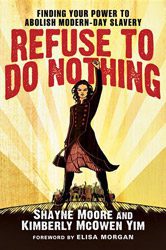 By Padma Kuppa, Blogger at the Patheos Hindu Channel
By Padma Kuppa, Blogger at the Patheos Hindu Channel
In their new book on ending modern-day slavery, Refuse to Do Nothing, “Abolitionist Mamas” Shayne Moore and Kimberly Yim share their stories of coming to terms with heartbreak – and the power they have to help people all over the world, victims of human trafficking. Shayne’s and Kim’s stories are not so different from mine – soccer moms moved by something bigger than themselves to become activists. I could relate to their experiences – I too thought “going to Target with no kids was a luxurious outing,” or had something happen “that changed the trajectory of my life.”
Shayne heard about the realities of the HIV AIDS pandemic in sub-Saharan Africa and its staggering realities. Kimberly Yim saw a documentary about modern day slavery that led her to create a movement in her own home town. As I read through their stories about different dimensions of exploitation of the powerless, I was troubled. My obvious concern was because they uncovered, chapter by chapter, more injustice, in greater detail, than I had known existed. But I was also troubled by the perspective that motivates them, and some of the organizations with which they are affiliated.
While faith is a motivator for doing good, the language used to present that faith can be daunting, exclusionary, even intimidating. One author’s words – “I learned that true safety only comes in obedience to where the Lord leads you” — discouraged me, as obedience does not suggest freedom – that which we are seeking for those enslaved today. The authors often refer to International Justice Mission (IJM), and on several occasions quote Gary Haugen, founder and President of IJM. In Haugen’s words, “The last people who should get caught off guard by injustice in the world should be Bible-believing Christians.” Are Bible-believing Christians better than others in dealing with injustice? IJM has a track record that is questionable. There is concern that their methods focused on saving specific girls from immediate situations of captivity can aggravate the broader political, economic, and social issues which are at the root of the problem.
Consider another quote, from Nathan George, founder of TradeAsOne. “What could happen if 130 million Christians embraced fair trade as a means of bringing good news to the poor and meaning to the rich?” As a non-Christian who sees what bringing the “good news to the poor” in India and other countries has done to other cultures and faith communities, not just historically but even today, I am skeptical that what could happen would be good. World Vision, an organization that does seek to do good on the one hand, has done much to promote militant Christianity in Orissa, a state in India where World Vision employees were implicated in the murder of a Hindu holy-man, or swami, who had been helping the tribal poor for decades. Books like Eliza Griswold’s The Tenth Parallel and Rosalind Hacket’s Proselytization Revisited go into great detail on how religion can exacerbate global conflict, and how organizations like IJM can be part of the problem instead of being a solution.
But there were poignant quotes too, like the one from Abolitionist Mama Tracy, who said, “I know I can use my voice, but when I joined my voice with others, I knew someone would hear.” The importance of language is explained, as related to Commercial Sexual Exploitation of Children (CSEC): manipulating a child into prostitution is now “child sex trafficking” and pimps are now “traffickers.” This new language has helped to create a paradigm shift, reducing the tendency to blame the victim and properly characterize the trafficker and customer as the ones committing a serious crime. And these words from Cindy Breihl of World Vision made me wonder if she wouldn’t be a good candidate to join WISDOM – a metro-Detroit women’s interfaith organization: “In our globally connected world women are natural change agents – whether in local community development where helping one woman impacts an entire community, to leading civil society, or at the peace tables in conflict.”
I appreciated the authors’ realization that the anti-trafficking movement, like any social justice movement inspired by faith, needs everyday people. It is where I found common ground and an impetus to help their social justice movement. It is similar to what I have realized about the interfaith movement that I have been part of for years. When one feels a passion about supporting a cause, one needs to invite friends, start a group, think about how to reach the community, figure out how to organize, plan an event or multiple, invite people in positions of influence, pool personal funds, and solicit donations. Hopefully I will have an opportunity to share with Shayne Moore, Kimberly Yim, and others like them, my passion for pluralism – that my faith, and those of others, especially the powerless and needy, be respected in their quest to share the good news and help others. A law was enacted to end slavery in the United States more than 150 years ago. Even earlier, this country was founded on principles of religious pluralism. But it will take more than just laws to stop people taking advantage of those who have less power, and that is why we must all continue to do something – whether to stop trafficking or to promote interreligious understanding.
For more conversation on modern-day slavery and what you can do, visit the Patheos Book Club here.












